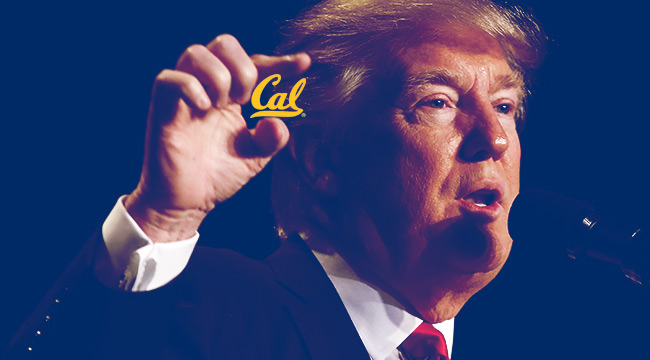
In light of Milo Yiannopoulous, a Breitbart editor best known for getting banned from Twitter for encouraging hate campaigns, having a speech at UC Berkeley’s campus canceled amid protests and violence, Donald Trump has threatened to cut federal funds to UC Berkeley. But is that a viable option?
Right now, there’s no concrete policy in place. But Trump specifically said, in a tweet, that if UC Berkeley doesn’t allow “free speech,” that he’ll consider removing federal funds from the university. That’s not a minor threat. In 2015, the federal government, through various agencies, granted $378 million dollars to UC Berkeley for various projects, the majority of which came from the Department of Health and Human Services and the National Science Foundation.
However, this isn’t just the college coming to the government and asking for money. UC Berkeley, like any college, instead either comes to the government with research proposals, or applies for federal funding to fulfill a specific research project. For example, one recent project was a $24 million grant over five years to build a “cellular machine shop,” tools for constructing machines out of living cells, while other recent grants for less than a million dollars will go to important historical research on slavery and translating texts to machine-readable code.
Genuinely excising a school from federal funding completely is close to impossible, in part due to how government grants work. For example, the “cellular machine shop” mentioned above is a collaboration between a private sector company and five different schools, including UC Berkeley. In theory, Trump could probably inform federal agencies under his purview that he’d prefer they refuse grant proposals from specific schools. But there are serious problems with that approach, bureaucratically and legally.
For example, the current head of the National Science Foundation, France Córdova, was appointed in 2014 to a six-year term that won’t be up until March 2020. More broadly, though, the University of California system would take Trump to court over attempts to defund a specific school in its system, and the law is against Trump. The first issue is that UC Berkeley, the institution, had nothing whatsoever to do with what happened to Yiannopolous. He wasn’t invited by the school itself, and it canceled the event due to “masked agitators” coming onto their campus, setting fires, and smashing barricades. It’s not clear these individuals have any association whatsoever with UC Berkeley in the first place, and if they do, it’s hard to see how their activities would possibly be sanctioned by the university.
Furthermore, denying government grants is a trickier legal business than you might think. A good historical precedent is Congress’ attempt to block “obscene” art from being funded by the National Endowment of the Arts in the late 1980s and early 1990s. These attempts were repeatedly struck down by the courts as being too vague. Most relevantly, the courts ruled that while nobody has a Constitutional right to a grant and that the government can place some restrictions on grants, government funding does not deny the receiver of the ability to use their Constitutional rights, and that previous exercise of Constitutional rights is no basis for denying government grants.
In short, Trump can make the threat. But unless he’s willing to go to court for a lengthy battle, it’s unlikely he can follow through.
